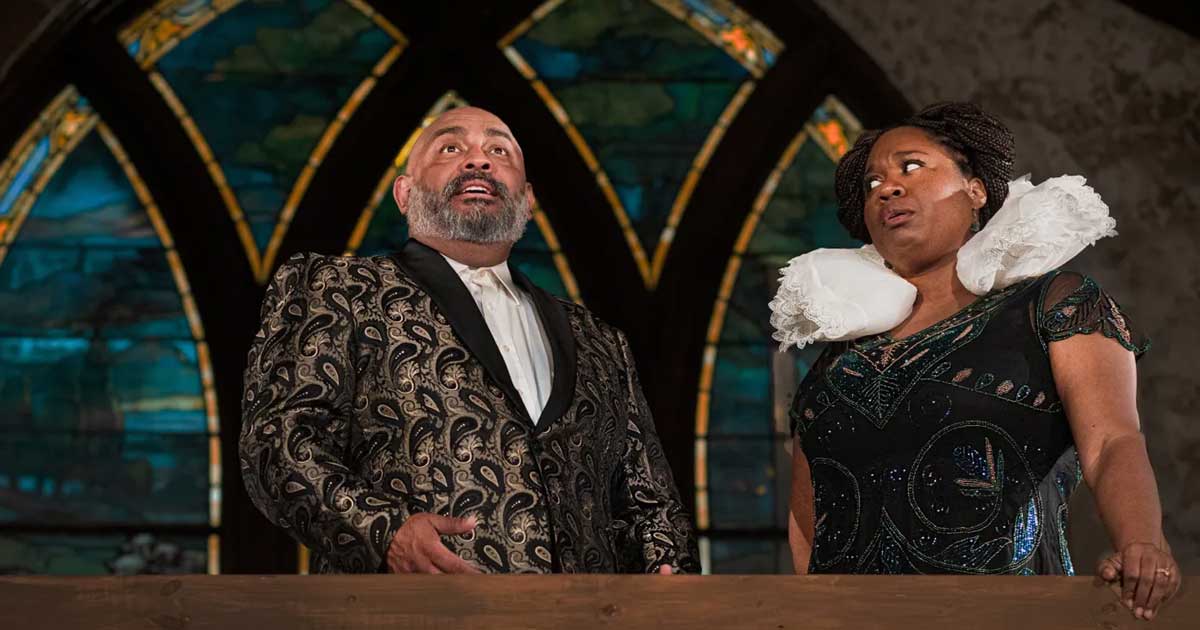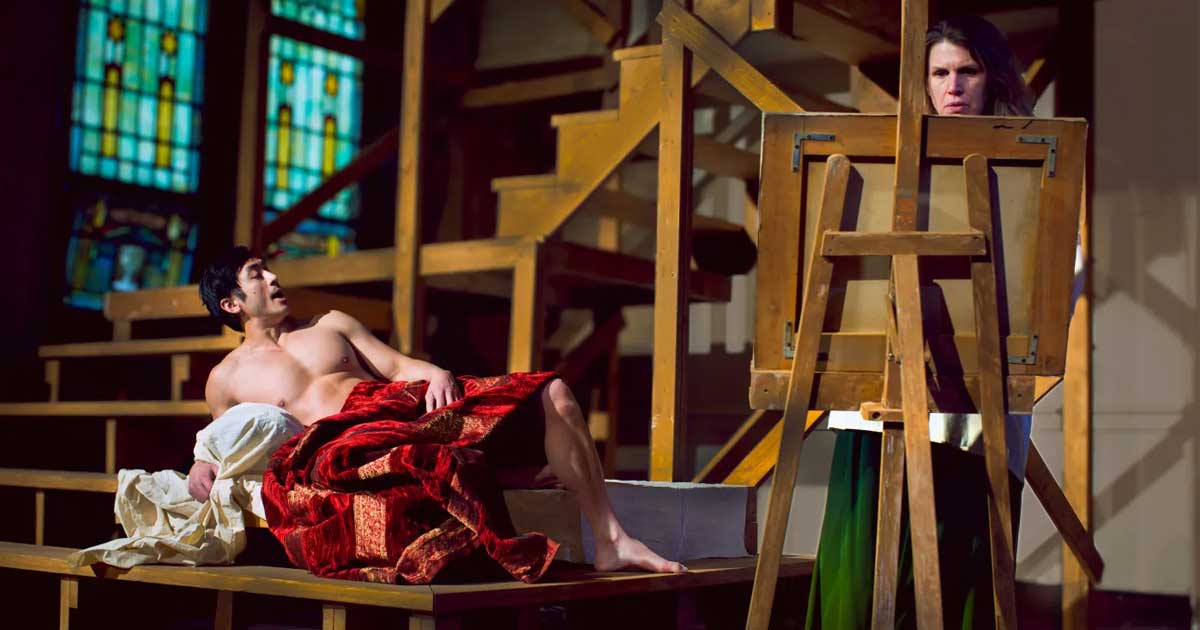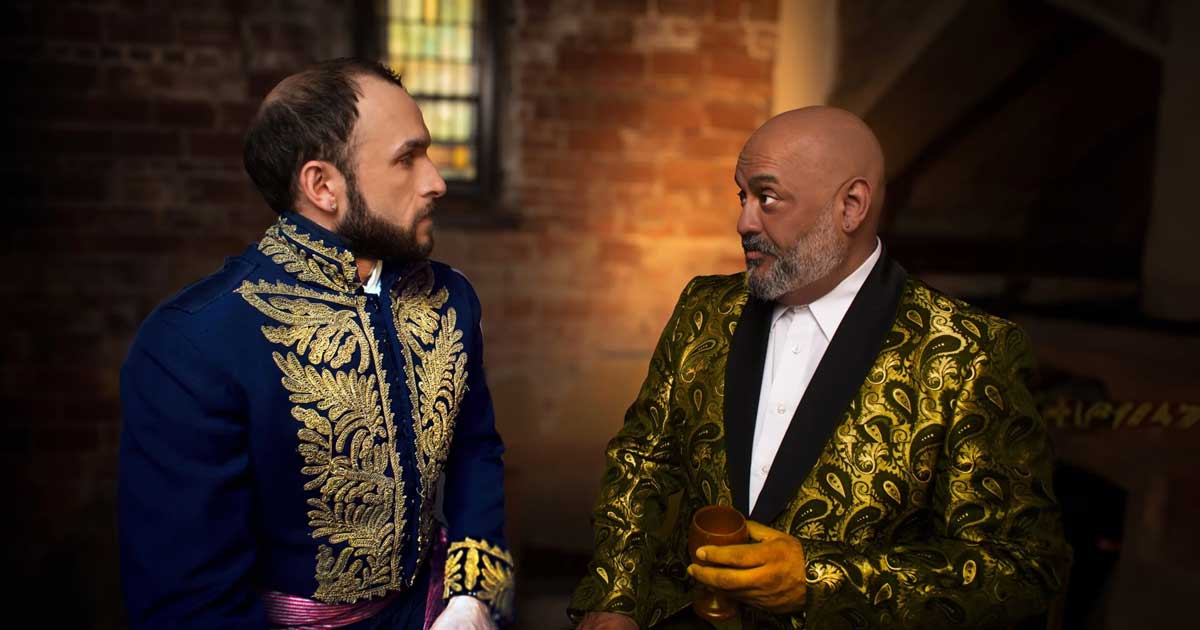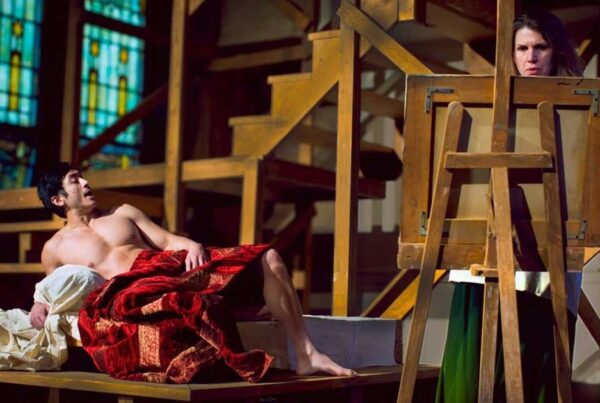
onStage – Lisa Velten Smith Executes a Demanding Role With Brio for Quantum Theatre.
Speaking truth to power is never easy, but when it comes in torrential waves, from a bawdy, belligerent, brilliant Renaissance-era woman, well, buckle up. A bumpy and breathtaking road lies ahead.
The woman in question, in Howard Barker’s Scenes from an Execution, is the 16th-century Venetian artist Galactia. An accomplished painter in a man’s world, she has been bestowed with the opportunity of a lifetime, despite her well-known promiscuity and proclivity for offending everyone in her orbit.
In the Quantum Theatre production now at Abiding Missions in Allentown, Lisa Velten Smith plays Galactia’s egocentricities to the hilt. Raw and ragged and resourceful with words and paintbrush, the Galactia adds another notch in the actor’s belt of indelible Pittsburgh performances, including Pittsburgh Public Theater’s A Doll’s House 2 and Quantum’s Far Away.

Hansel Tan and Lisa Velten Smith in a scene from ‘Scenes From an Execution’, the Quantum Theatre season finale. (Images: Jason Snyder)
In the latter, a memorable video presentation, Velten Smith starred opposite her husband, Andrew William Smith, who directs the Pittsburgh premiere of Scenes From an Execution.
The production maximizes Barker’s mixed messages about who holds the power when it comes to art: the artist, the patron, the authoritarian, public sentiment … all or none are on the table, for it may just be that unleashed art stands on its own, open to as many interpretations as there are those who behold it.
We meet Galactia in a state of agitation that is maintained throughout. Her young, married lover (Hansel Tan), an artist known for his endless paintings of “Christ Among His Flocks,” arrives and quickly strips for lovemaking.
However, we learn quickly that he is constantly dressed down and built up by Galactia, who makes his devotion difficult, to say the least. Yet they remain entwined by love, or lust, at the least.
Such paradox is woven throughout Scenes from an Execution, just as its title suggests both creation and the carrying out of a death sentence.
The keys to Barker’s Renaissance art kingdom are seen in the hands of people representing all walks of life, from soldiers to admirals, from the highest clergy to a wounded veteran, from a respected critic to preening aristocracy, from apprentices to working artists.
Perhaps it is because I am a critic that the line I can’t forget – among many memorable lines in Scenes From an Execution – is spoken by a powerful patron, who claims to love both art and artists:
“Art is opinion, and opinion is the source of all authority,” declares the Doge, then the highest secular official of Venice.
The Doge is played with gusto and comedic flair by Robert Ramirez, the head of the Carnegie Mellon School of Drama, making a splashy Pittsburgh stage debut. His character has commissioned Galactia to paint an enormous mural that illustrates a triumphant naval battle, replete with Venetian heroes including his brother, the supercilious Admiral Suffici (Jerreme Rodriguez).

Jerreme Rodriguez and Robert Ramirez as the brothers Suffici and the Doge.
(Image: Jason Snyder for Quantum Theatre)
The Doge expects a canvas depicting nobility and courage for proud Venetians. Instead, Galactia determines to represent the atrocities of war.
The realist painter is inspired to guts and not glory by a battle-scarred survivor with an arrow shaft sticking from his head. As she gets deep into her vision, she is moved to observe that a severed hand is not only pitiful, but eloquent.
Randy Kovitz plays the soldier in a deliciously understated comedic turn, among other roles, and has a surprise up his sleeve as well. Another veteran Pittsburgh actor, Martin Giles, is a delight as Cardinal Ostensible, who demands accountability for Galactia’s depiction of wartime brutality.
You can hardly blame the clergyman. Even if you agree with Galactia’s ideals, it is hard to feel in tune with a person who gorges on self-indulgence. Her obliviousness to the effect she has on others are both fun and cringe-worthy, including her behavior at the funeral of a fellow artist.
It is therefore easier, with admitted unease, too, to empathize with the patron whose trust she has betrayed. The Doge has given her an enormous opportunity, despite knowing of her proclivities, but in great admiration of her art. In the Doge’s efforts, he recruits the critic Gina Rivera (Bria Walker-Rhoze), who finds ways of supporting both the patron and the artist in her understanding of what is at stake.
When it comes time to deliver punishment, the amiable Doge is inclined toward leniency – something you might imagine is not in Galactia’s nature.
Amid the artist’s rants and how she is perceived by others, I’ll wager that Barker has left few adjectives representing contempt and admiration unsaid.
Finally, the Doge is moved to cry, “Shut up,” there is so much noise about Galactia’s character.
It is Velten Smith’s triumph that Galactia’s fiery, unapologetic nature reveals itself as a runaway train – she hurls herself full-throttle at the artist’s scandalous extremes and relentless need to hear her own voice.
Galactia’s dismissiveness of others, including her daughter-apprentices Supporta and Dementia (Leyla Davis and Mariana Garzon Toro, both seniors at Carnegie Mellon), is absolute, and might make you consider: Does the artist have the heart of an authoritarian herself? Or is the power she grants herself a form of push-back against the patriarchy?
Along the way, we hear from a character known as “Sketchbook” – Amy Landis, representing what is unseen in notebooks and on canvases. Landis is among those who uplift multiple roles, in a marvelous cast, in a play that is as much about what we paint with words as it is about the nature of art.
The atmospheric upstairs of the century-old Abiding Missions building, with its pitched ceiling and symmetrical decor, offers great bones for the multi-level set devised by scenic designer Chelsea Warren, aided by C. Todd Brown’s lighting, from dungeon-level darkness to blaring lights.
Barker and likewise this production do not shy from language, attitudes and props that suggest a few hundred years hence from the 16th-century setting, befitting the paradoxes of a play considered to be the playwright’s most accessible. Within the construct of then and now, we may feel connected to Galactia across the centuries, and are reminded of how out of step she is within her world.
Galactia’s turmoils run deep. For example, she talks of her fading looks at age 46 and revels in her young lover’s devotion, yet she does nothing to enhance her appearance, and she disdains his dim mind.
Ultimately, there is a price to be paid for Galactia’s unorthodox lifestyle and artistic rebellion, yet it is not what you might imagine.
Be advised to leave expectations at the door when it comes to the world created by Quantum Theatre for Scenes From an Execution. You may at first feel as if you have been drawn back in time to the Renaissance, but its themes reverberate today, connecting the worlds of art, feminism and commerce, and in seats of power.
TICKETS AND DETAILS
Quantum Theater’s production of Scenes From an Execution runs 7:30 p.m. Tuesday-Sunday, through April 27, 2024, at Abiding Missions, 731 Excelsior Street (a block off East Warrington Avenue). For tickets and special events during the production, visit https://www.quantumtheatre.com/execution/.
Notes: The show includes nudity and adult content. … There is no late seating from the 7:30 p.m. start. … Abiding Missions is located on a narrow street, above the East Warrington Avenue business district. Arrive with time to find street parking. … Running time: two hours with a 15-minute intermission.




